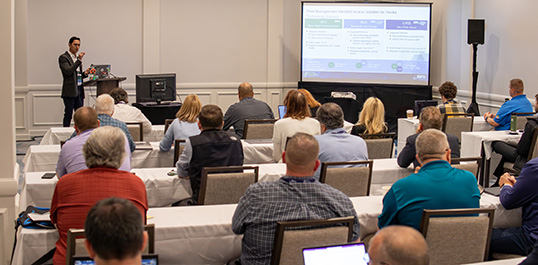Volume 27 | Issue 2
Click here to read the complete illustrated article or continue below to read the text article.
Those involved in the supply chain must brace themselves for ever-evolving cybersecurity threats. The lessons learned from 2023 provide a foundation, but the dynamic nature of cyber threats requires ongoing vigilance and adaptation. The National Motor Freight Traffic Association, Inc. (NMFTA)™ aims to stay ahead by anticipating future challenges through diligent research and collaboration with other cybersecurity organizations.
The supply chain’s critical role in maintaining economic stability, public health and safety, national security, and technological advancement highlights its importance as critical infrastructure. Disruptions in the supply chain can have far-reaching consequences, making its resilience and efficiency vital to the functioning of modern societies.
Phishing remains a prominent tactic used by cybercriminals to infiltrate enterprise systems. These deceptive communications trick recipients into clicking malicious links or opening harmful attachments. In the supply chain industry, phishing scams can lead to security breaches, including ransomware attacks.
To combat phishing, supply chain companies must prioritize employee training. Workers should be adept at identifying suspicious emails, such as those from lookalike URLs. For instance, a phishing email might use “dellIogistics.com” instead of “delllogistics.com,” where the letter ‘I’ replaces the ‘L’. Employees should verify sender addresses and scrutinize links before clicking. When in doubt, they must refrain from opening attachments or clicking on links. In addition, it’s imperative that companies deploy a software solution in addition to training to help combat phishing.
API security is critical for both host-side and mobile integrations. APIs are essential for workflow and telematics systems but pose significant security risks. Key concerns include:
Addressing these issues requires rigorous security measures, including regular audits, robust authentication protocols, and continuous monitoring of API activities.
The increasing integration of technology in trucks introduces new vulnerabilities. Modern trucks equipped with on-board diagnostics, telematics systems, and sensors can be targeted by hackers. During a recent NMFTA Cybersecurity Conference, we hosted a live truck hacking demonstration which showed how a hacker could manipulate a truck’s brakes using a simple antenna.
NMFTA recommends that fleets implement cybersecurity measures to protect their critical systems from cyber threats.

Several organizations have provided insights into the cybersecurity landscape for 2024:
WatchGuard Predictions
AI will significantly impact cybersecurity, both positively and negatively. Key forecasts from Gartner, Forrester, and Trend Micro include:
Key expectations from Google Cloud/Mandiant include:
Global elections will be prime targets for cyberattacks, including:
The cybersecurity landscape presents numerous challenges for the supply chain industry. From phishing attempts to API security breaches, to evolving AI-driven attack vectors, these examples emphasize the need for proactive measures. Companies must stay vigilant, continuously train their employees, and adopt advanced cybersecurity technologies to safeguard their operations and the greater supply chain.
NMFTA remains committed to monitoring these trends and sharing insights with the industry. Our efforts will culminate at our annual NMFTA Cybersecurity Conference on October 27-29, 2024, in Cleveland, OH, where we will discuss the latest developments and strategies in cybersecurity. For more information, visit www.nmftacyber.com.

About the Author:
Joe Ohr has more than two decades of experience in technical operations, customer success management, customer support, and product support.
Currently serving as the Chief Operating Officer for the National Motor Freight Traffic Association, Inc. (NMFTA)™, he plays a pivotal role in helping to advance the industry through digitization, classification, and cybersecurity.
Prior to Ohr’s role at NMFTA, he served as in numerous engineering and operations positions at Qualcomm and Eaton, and most recently held the position of Senior Vice President of Operations/Customer Experience at Omnitracs.
Throughout his career, Ohr has provided strategic guidance, vision, and a roadmap for addressing long-term customer challenges. He has played a key role in accelerating revenue growth and has collaborated closely with IT, product, and engineering teams to foster stronger partnerships with strategic customers and peers. Additionally, Ohr has overseen post sales customer support and service teams, as well as operations, managing a workforce of over 400 individuals.
He holds multiple certifications such as CCNA from Cisco and MCSE from Microsoft and earned his Bachelor of Science in Education from the Ohio State University. Due to his contributions to the industry, he earned a spot in the Inner Circle in 2015 and 2018 from Qualcomm and Omnitracs.
Scott Ellyson, CEO of East West Manufacturing, brings decades of global manufacturing and supply chain leadership to the conversation. In this episode, he shares practical insights on scaling operations, navigating complexity, and building resilient manufacturing networks in an increasingly connected world.